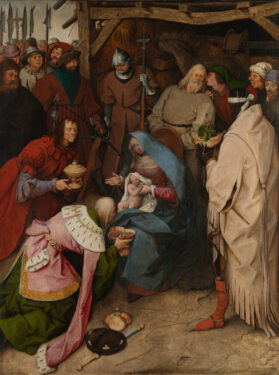
In recent years I have moved away from criticizing the secularization of the feast of Christmas and come to think of the Incarnation as an event and mystery that embraces and changes everything. Probably the least correct way to think of the Incarnation of the Son of God is as an isolated event that only influenced those who were contemporaries of Jesus.
No! The Incarnation is a cosmic event and its power extends to all peoples throughout history and even to the material universe. I believe it is impossible to overemphasize the power of the Incarnation. It is at the center of God’s revelation. Everything that God has told us is related to the Incarnation.
The mystery of the Incarnation has made our lives sacramental and indeed all of reality sacramental. I have confessed in one of my previous columns how during an advent season many years ago when I was in the major seminary studying for the priesthood I came to realize that what Catholics call sanctifying grace means that we share the life of God. Why so many years of Catholic education had been experienced by me before I discovered this important truth I do not know.
I do recall that the insight came to me in chapel while I was reading a book that was considered a Christian classic. My first reaction was confusion. I wondered if I was misreading the book. I also wondered that if I was reading it correctly why I had never before realized that this was what Catholics meant by sanctifying grace.
We call living in the state of grace living supernaturally, living beyond what is natural for human beings. I eventually came upon a relatively simple analogy that helped me to grasp something of the mystery of grace. If a tree or a plant begins to move from place to place that tree or plant would be living supernaturally. It is not natural for a tree to move.
That activity goes beyond what is natural for a tree. If a dog began to speak that dog would be living supernaturally. Speaking is not natural for a dog. If a person shares in the life of the Blessed Trinity, that person is living a supernatural life. It is not part of human nature to live God’s life. That the Son of God became human led to us becoming sons and daughters of God, sharing in the intimate life of Father, Son and Holy Spirit. Our sharing in God’s life became possible through the life, death and resurrection of Jesus.
Probably each of us will celebrate the holiday season a little differently. However we celebrate I think the celebration can and should be related to the meaning of the Incarnation. That mystery is the ultimate reason for all Christmas celebrations. Think of some of the events that might occur in our lives during the Christmas season. There might be family reunions, special dinners, special parties, receiving and sending Christmas greetings through the mail, exchanging gifts, visiting relatives and friends.
All of these activities are ultimately related to the Incarnation. I believe that the Christmas joy that seems to touch everyone during the Christmas season is ultimately due to the Incarnation even when it is experienced by those who do not believe in the birth of God’s Son. I recall reading a Catholic columnist who claimed that if he ever lost his faith, he would have to lose it again every Christmas.
For most of us probably the feast of Christmas brings back the memories of loved ones who have died. Every year, around the time of the feast, memories of my sister and me opening gifts on Christmas morning return to me. I only recall a few of the gifts but the joy and excitement I recall vividly. That my sister died young colors the feast for me.
I know it made the Christmas season a sad time for my mother. I imagine that may be an experience for many who have lost loved ones. But the feast tells us that they are not lost. In some ways they are closer to us than ever. The separation is temporary. We never want to forget that.
Perhaps each of us is looking forward to some special event we plan to experience either on Christmas day or during the Christmas season. Whatever it is, I suggest we connect it in our minds with the most important event we celebrate at Christmas. Our faith in the Incarnation gives every human experience a special depth and beauty. The meaning and mystery of the Incarnation is like a love explosion that stretches through the centuries deepening the meaning of human existence and love. May all experience God’s blessings this Christmas!
Father Lauder is a philosophy professor at St. John’s University, Jamaica. He presents two 15-minute talks from his lecture series on the Catholic Novel, 10:30 a.m. Monday through Friday on NET-TV.
